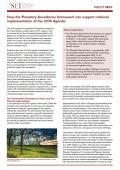
The 2030 Agenda for Sustainable Development, adopted by the United Nations member states in 2015, requires “each government (to set) its own national targets guided by the global level of ambition” set out by the Sustainable Development Goals (SDGs). This formulation leaves question marks over exactly what is the global level of ambition, and how individual countries should set national targets that are consistent with it. One way that the Planetary Boundaries framework can facilitate this process is by defining safe limits for human disturbance of a number of earth system processes – which are easily translated into global levels of ambition. These global ambitions and allocations can then be downscaled to the national level. Furthermore, the downscaled Planetary Boundaries, in combination with consumption-based environmental accounting, can help to operationalize SDG 12 on Sustainable Consumption and Production, in particular, by serving as benchmarks for a country’s total – internal and external – environmental performance.
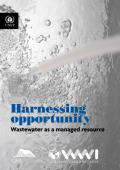
Wastewater is a valuable resource that we need to harness. That is the key message in a new publication from UN Environment, the Global Programme of Action and the Global Wastewater Initiative.
The issue of what to do with wastewater, that is water that has been adversely affected by human activities such as farming, industrial production and domestic use, has long challenged development experts, companies, environmentalists, policymakers and urban planners alike. And although improvements have been made, it is still true that globally, about 80 per cent of wastewater is being discharged untreated. This has negative consequences for nature and humans alike. Untreated wastewater degrades the marine environment, and can contribute to the creation of so-called dead zones. Areas of the ocean that are so depleted of oxygen that they are void of marine life. At the same time, poor wastewater management and improper sanitation represent a significant factor in the spread of infectious disease.
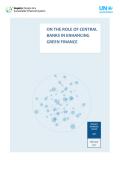
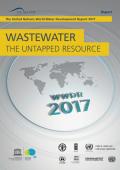
Most human activities that use water produce wastewater. As the overall demand for water grows, the quantity of wastewater produced and its overall pollution load are continuously increasing worldwide. Over 80% of the world’s wastewater – and over 95% in some least developed countries – is released to the environment without treatment. Once discharged into water bodies, wastewater is either diluted, transported downstream or infiltrates into aquifers, where it can affect the quality (and therefore the availability) of freshwater supplies. The ultimate destination of wastewater discharged into rivers and lakes is often the ocean with negative consequences for the marine environment.
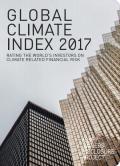
The world’s biggest investors are responding to the global commitment to tackle climate change and are rapidly scaling up action to protect their portfolios, reveals this annual benchmark report on the industry from the Asset Owners Disclosure Project
The fifth AODP Global Climate 500 Index launches after a year of rapid developments in articulating the financial risks of climate change to the global economy. Climate risk rose further up the investor agenda in 2016. The Paris Climate Agreement came into force in November, including a recognition that financial flows must be aligned with the commitment to keep climate change well below 2C. Regulatory change is on the agenda, with France implementing a worldfirst mandatory climate risk disclosure requirement for institutional investors and the Task Force on Climate-related Financial Disclosures delivering its recommendations to the Financial Stability Board, for consideration by the G20 in July this year. The scales have tipped – a 60% majority of Asset Owners, and half of Asset Managers are now taking action to manage the risks and opportunities posed by climate change.
